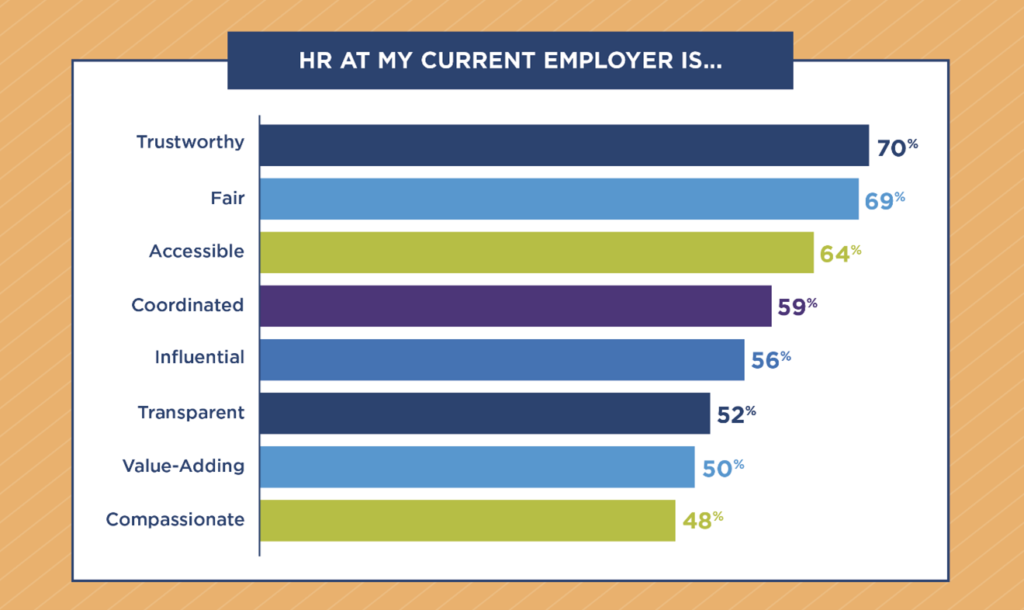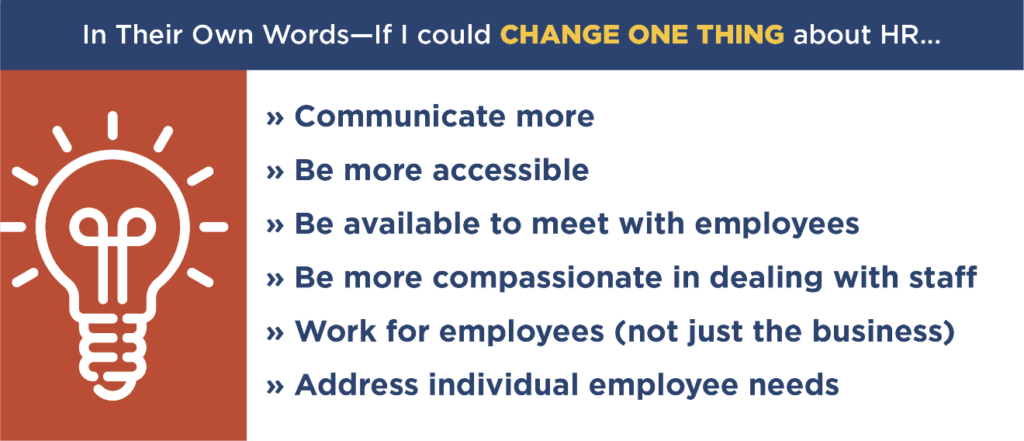Sign up for SmartBrief on Workforce today for free.
2022 is anticipated to be a year in which pandemic-weary employees take advantage of a tight labor market and reevaluate their work lives. Understanding what employees think about HR is a key to retaining employees in this environment.
A recent APQC survey on HR customer satisfaction found that employees who are satisfied with HR are more likely to be satisfied with their employment experience and to be confident that they will stay with their current employers over the next year.
In the survey, we asked employees for feedback on HR at their current employers. Their responses point to ways to promote HR customer satisfaction and potentially ease the threat of employee turnover at the same time.
With nearly three-quarters of surveyed employees confident they could get another job if they wanted to, now is the time for HR to fully deliver on employee needs.
What employees think about HR: The good news
Employees are satisfied with HR’s performance in a number of areas.
Employees see HR as trustworthy and fair
Strong majorities of employees experience HR as being trustworthy (70%) and fair (69%). Trustworthiness and fairness are foundational to effective HR work. Without them, employees are less likely to be receptive of or pleased with HR efforts.
Employees are satisfied with the quality and ease of HR work
Similarly, a majority of employees are satisfied with the:
- quality of HR’s work
- ease of completing HR work
- ease of finding HR information
Performing quality work and making HR tasks easy for employees to complete are core aspects of HR delivery. As such, they are also foundational to employee satisfaction with HR. Moreover, HR functions that can provide the basics seamlessly have more time to perform higher-order activities that further bolster employee satisfaction.
What employees think about HR: The bad news
There are aspects of HR for which fewer employees expressed satisfaction.
Fewer employees see HR as compassionate or value-adding
Comparatively fewer employees agreed that HR is compassionate (48%) or value-adding (50%).
Employees told us that they are experiencing high levels of pandemic-related stress and indicated that they are looking for high levels of compassion from HR. They are also looking for HR to add value not just for the business, but also for employees.
One-third of employees see HR as primarily supporting business interests, as opposed to business and employee interests.

Fewer agree HR is in touch and makes them feel valued
Just under half of employees agreed that HR:
- is in touch with employee feelings and needs
- acts on employee feedback
- makes them feel like they belong
- makes them feel like a valued employee
Even fewer agree HR supports their work
Roughly one-third of employees agreed that HR:
- helps them to be productive
- contributes to them being motivated in their work
- helps them to do their best work
Employees want HR to communicate and connect on an individual level
We asked employees: “If you could change one thing about HR, what would it be?”
Common suggestions were for HR to:
- communicate more
- be more accessible
- be available to meet with employees
- work for employees (not just the business)
- address individual employee needs

4 focus areas to improve satisfaction with HR and promote retention
Looking across the survey findings, we identified four focus areas for improving employee satisfaction with HR and at the same time supporting the employee experience and retention.
Focus area No. 1: Listening to employees
Employees told us that there is an opportunity for HR to better understand and serve them. And our analysis points to the benefits of acting on this advice. We found that when HR listens to employee feedback, is in touch with how employees feel and what they need, and acts on this information, employees are more likely to have a positive employment experience and to intend to stay with their employers.
Focus area No. 2: Making HR personal
Employees went further to say that they want HR to listen and respond to them in personal ways. Again, our analysis supports the benefits of meeting employee needs. When HR staff are accessible to individual employees and find ways to address individual employee needs, they support HR customer satisfaction, the employment experience and employee retention.
Focus area No. 3: Enabling great work
Employees also want HR to support them in doing their best work. Employees who agreed that HR motivates them, helps them to be productive and supports them in balancing work and personal demands were more likely to be satisfied with their employment experience and to intend to stay.
Focus area No. 4: Paying attention to feelings
Finally, employees want their great work to be valued. They want to feel their contributions make a difference and that their unique qualities are accepted and appreciated. Here again, our research shows that when HR delivers in these areas, employees are more likely to have a positive employment experience and to plan to stay at the organization.
Conclusion
Honest employee opinions about HR reveal secrets to deterring employee resignations. The honest opinions that employees provided in APQC’s HR Customer Satisfaction survey point to four areas where HR functions can improve.
When HR delivers improvements in these areas — listening, personalizing, enabling work and paying attention to feelings — it supports not just HR customer satisfaction, but also the employee experience and employee retention.
Elissa Tucker is the principal research lead in human capital management at APQC, a non-profit business research organization. In this role, she develops and executes APQC’s human capital management (HCM) research agenda. With more than 15 years of experience researching HR, Tucker has completed research studies on HR strategy, strategic workforce planning, talent acquisition, talent development, and employee engagement. She is also a frequent contributor to HR events and publications. Find Tucker on LinkedIn.
If you liked this article, sign up for SmartBrief’s free email newsletters on HR and leadership. They’re among SmartBrief’s more than 250 industry-focused newsletters.
